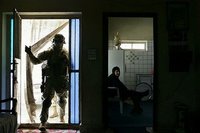One Man's Civic Duty
Michael White of Stone Mountain, Ga., says he keeps his website that lists military fatalities free of politics, largely because he has learned how much the families of troops rely on his figures. His site is frequently cited by the media for up-to-date and accurate body counts in Iraq. Military families rely on it because it is more current, accurate, and user-friendly than the Pentagon's.
I go to his site, Iraq Coalition Casualty Count every morning first, because it's at the top of the "Readme 1st" folder in my bookmarks menu. After consulting his site, I update The Vigil with the latest measure of cost in blood of Bush's un-provoked, unnecessary, largely unilateral invasion and unplanned occupation of Iraq (UULUIUOI).
 This morning, for example, I learn from White's site that we have sustained six service personnel KIA's (killed in action) in Iraq over the past 24 hours. Those deaths are attributed to hostile action, not traffic accidents. And these are not conflated with casualties in Afghanistan, as are the Pentagon's.
This morning, for example, I learn from White's site that we have sustained six service personnel KIA's (killed in action) in Iraq over the past 24 hours. Those deaths are attributed to hostile action, not traffic accidents. And these are not conflated with casualties in Afghanistan, as are the Pentagon's.
I also note from the White's ICCC that, as of 7-Nov-06 our severely wounded in Iraq since the UULUIUOI's beginning totals 9,820. That's not our total wounded, which would be about double. 9,820 is just the number of wounds which were so severe that our marine, soldier, sailor or airman could not be returned to duty. We readers are left to interpolate within that figure another unspoken, unwritten, unprinted, and unknown statistic as to how many of these walking and unwalking wounded have sustained life altering injuries such as amputations, spinal cord damage and post-traumatic stress disorder (PTSD). And, of course, we will only realize decades from now - if we ever know - the full multiplying toll and effect of these unkept statistics on the families of our 'returned' service personnel.
There are many other features offered on the ICCC. You can find an incomplete count of all the private contractors, broken down by nationalities, killed by hostile action; that would be 370, if you're interested. I am, because these, too, should be counted as a cost of the UULUIUOI.
Another stat, which we shouldn't ignore are the number of journalists KIA. They elected to put themselves in harm's way, but they did it in order to tell the story of this invasion and occupation so that the rest of us would be better informed, should we so choose. Many of these were Iraqis stringers, because Western reporters, choosing discretion over valor (understandably), report from the Green Zone - the only secure ground in Iraq. The ICC also compiles each day, 'ground-zero' reportage of unvarnished events going on in Iraq. It's a harsh read - too much for me, I have to acknowledge.

 There's much, much more to Mike White's site: more than I ever wanted to know about the UULUIUOI in terms of charts, maps, and names, names, and more names. I wouldn't have looked this deeply into his abyss had not the Los Angeles Times featured it on its front page this morning.
There's much, much more to Mike White's site: more than I ever wanted to know about the UULUIUOI in terms of charts, maps, and names, names, and more names. I wouldn't have looked this deeply into his abyss had not the Los Angeles Times featured it on its front page this morning.
I commend the Times for thus recognizing Michael White's service to his country, and recommend his ICCC site to all my readers.
 A Micro-Civil War Around and Within the National Security Council?
A Micro-Civil War Around and Within the National Security Council?

























































